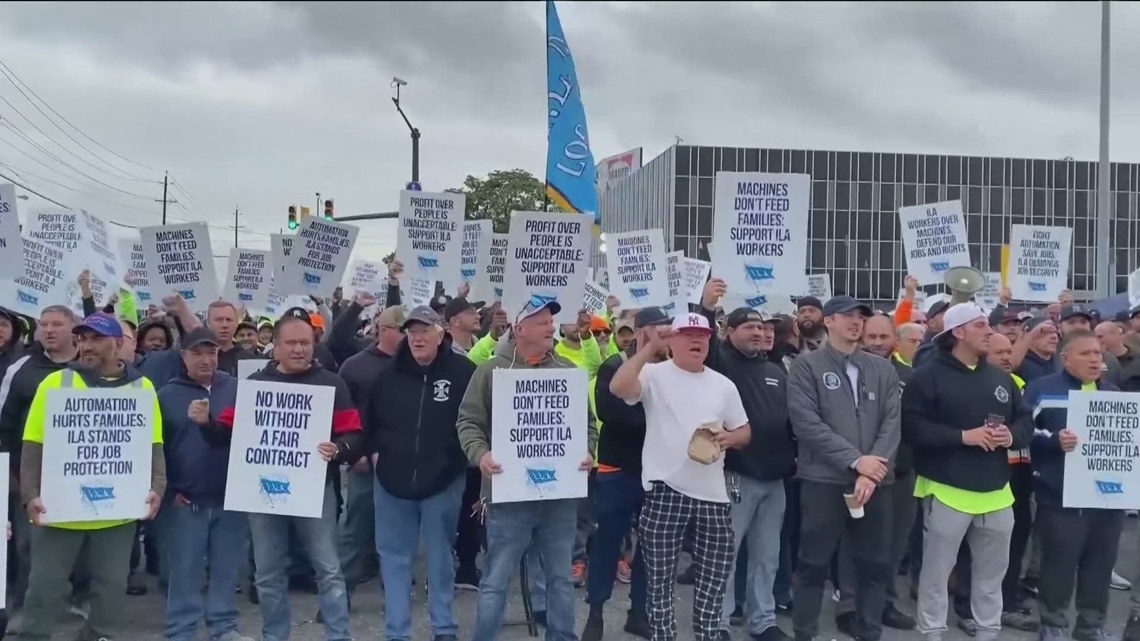The strike began earlier this week, and if it goes on for weeks and months, it could have a devastating effect on Georgia’s economy, experts say.
COBB COUNTY, Ga. — Miguel Tirado’s eyes dart back and forth at a park in Marietta. Between his two little ones and the family dog, he has to stay alert. Tirado’s also keeping an eye on his budget — taking certain steps to make sure he can continue to provide for his family.
“Gas prices have somewhat stabilized, but groceries, it’s a roulette,” Tirado said. “Every time you go, you don’t know how much it’s going to be. We have to budget. We buy the same things. We buy what’s in season.”
Tiffany Lau worked on her backhand at a nearby tennis court. The college student is eager to get a new car to make her commute to school easier. With interest rates slowly lowering, she’s optimistic she’ll be able to get a ride sooner rather than later.
“The economy is kind of odd right now,” Lau said. “It’s a lot of money, and you need a car, but you could also spend your money on other things too. You have to really manage where you put your money and if it’s really worth buying a car.”
Buying a car may be more difficult due to a major labor strike involving tens of thousands of dockworkers. Major ports across the Eastern seaboard and Gulf of Mexico, including the port of Savannah, are shut down as the strike continues.
Professor Sina Golara teaches supply chain economics at Georgia State University. He said inflation initially led the workers to demand higher wages, and automation has the workers worried about their livelihoods. At the same time, employers are making the case that the cost of doing business has also gone up, which is why they are unable to meet the wage demands.
“Strikes like this can really cripple the whole economy,” Golara said. “It’s the worst time of the year for retailers. The biggest amount of activity and sales happen at this time of the year. So the effects of such a strike is amplified, multiplied.”
Golara said the effects of the strike could be devastating in Georgia over the next several weeks. He said imports account for around one-third of Georgia’s economy. The strike is impacting the auto sector, apparel and other essential goods. As long as the strike goes, Golara said, the backlogs could grow and snowball into separate supply chain issues. Golara said once retailers run out of limited inventory, prices could be back on the rise to make up for the dwindling supply.
“The longer it is, the worse off the consumer is going to be,” Golara said. “It’s kind of a situation where it requires a lot of flexibility. It requires realistic analysis. It requires economic perspective. I hope other non-economic factors don’t come into play to move us away from an optimal outcome.”
The looming supply chain backlogs are reminiscent of issues during the pandemic that made for long deliveries and pricey items. Some businesses have adjusted to the strike by finding alternate routes, ramping up supply or finding other supply sources that may not be impacted by the dockworker strike.
Dr. Jerry Parrish, the chief economist with the Metro Atlanta Chamber, sent 11Alive the following statement:
“Importers and exporters who use East Coast ports have known a strike was possible for weeks now. Many of them have stocked up on products and, in some cases, re-routed shipments to mitigate the impact. If this strike lasts only a few weeks or so, we expect most consumers won’t notice a meaningful difference. However, if the strike lasts longer, it will impact freight rates which would likely ripple throughout the economy. That impact will be felt in some food supplies, auto parts, and other consumer goods.”
Tirado said he may stock up on essentials like baby wipes and detergent before the economic situation turns worse. He acknowledged the holidays may look a little different if the strike has debilitating impacts on the economy.
“Buying more experiences rather than gifts,” Tirado said. “So for Christmas, you may go somewhere instead of buying things. Because of the uncertainty, I think we’ll be okay because most of the stuff we buy are local goods, and we’re not doing any big ticket price shopping.”

